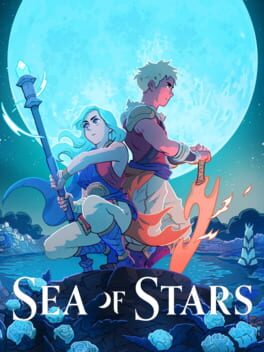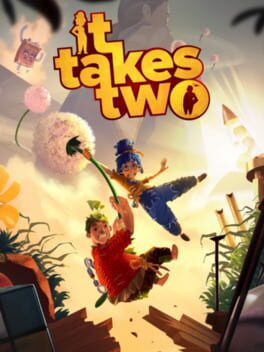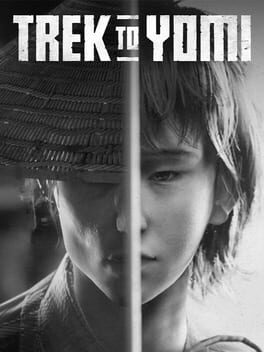hostvarious
23 reviews liked by hostvarious
Cocoon
2023
Inside is one of my favorite games of all time, because of how intense its atmosphere is and how well it conveys feelings without a single word uttered throughout its playtime. Of course I was expecting Cocoon to be a good game and it surely was. It's probably one of the most intricately and beautifully designed puzzle games of recent years and I really love how it made me feel smart, instead of feeling stupid, like so many other puzzle games usually make me feel. What I really missed here is a similar dark and gritty atmosphere and the art style, while of course being presented in great fashion, wasn't really my jam. Big recommendation still.
Sea of Stars
2023
It Takes Two
2021
Lots of fun and incredibly imaginative. The story was a bit lacking and at times saccharine. The voice acting was great with the exception of the little girl who was both grating and terrifying. This is a great game to play with a partner or friend who isn't necessarily "into video games" while still being enjoyed by someone who is, and for that reason stands on it's own as a great game. All this being said, I wish the puzzles were a little more difficult to solve. Alas, no one has been able to recreate the co-op mode in Portal 2.
It Takes Two
2021
A great game for people to play co-op, however there are some more than frustrating sections if you're playing with a non-gamer, unfortunately if you are playing with someone who games then the game becomes unbelievably easy and barely puts up a challenge.
I do really like the overall art style, and you can tell that lessons were learned from the previous co-op entry from this studio. However, the dialogue here goes in circles over and over in every single cut scene. Not a narrative or writing masterpiece by far, but the gameplay well makes up for it.
I do really like the overall art style, and you can tell that lessons were learned from the previous co-op entry from this studio. However, the dialogue here goes in circles over and over in every single cut scene. Not a narrative or writing masterpiece by far, but the gameplay well makes up for it.
It Takes Two
2021
It is definitely a lot of fun and all the different worlds are so beautiful to look at and run around in, but there are some caveats too. Most things are rather easy, especially boss fights, and the story has some beats that feel really out of place (vacuum, elephant and moles is all I'll say to not spoil anything)
It Takes Two
2021
Citizen Sleeper
2022
Really liked enjoyed this game during the early parts, reminded me a lot of the time management and pressure from something akin to Paper's Please. However once you get only about an hour in, the game's difficulty drastically drops, as does a lot of the tension related to certain timed events once you get a feel for how the game works, and the game kind of just becomes a process of waiting for things to happen or items to drop in order to finish the story. Overall though the story and world is pretty solid and worth checking out if you are interested.
Citizen Sleeper
2022
It's a testament to how much I like Citizen Sleeper that I'm giving it four stars despite having the absolute worst copy-editing I've ever seen in a professionally-released video game. It is strewn with typos, spelling mistakes, grammatical errors, and a thoroughgoing lack of understanding of the typographical conventions of written English. It is embarrassing, particularly in a game whose focal point is its writing.
All that said... it's still a good game. It walks in the footsteps of similar "modular narrative" games like 80 Days and Sunless Skies in using a light resource-management system to drive the player to allocate their time between many different bite-sized threads of plot, creating an individual route through the game's story. This is one of my absolute favorite microgenres but a difficult one to get right, and I'm thrilled with any game that can pull it off competently.
Citizen Sleeper isn't as successful at this as its forebears, though. By the end of the game you have enough resources to do almost everything the game has on offer, and there turn out to be minimal ways that plots can differ from playthrough to playthrough. Starting a new save feels more onerous than exciting, knowing that so much of it will be clicking through the same dialog rather than forging new paths.
I often finish modular narrative games with a sense that the system on which its built still has untapped potential. The calculus of quests taking inputs and producing outputs while clocks tick down cycle after cycle is simple but expressive—it could give rise to such an intricate web of interlocking threads. Is it too much to hope for that, with the groundwork now laid down, another game could be created on top of it... this time with an editing pass?
All that said... it's still a good game. It walks in the footsteps of similar "modular narrative" games like 80 Days and Sunless Skies in using a light resource-management system to drive the player to allocate their time between many different bite-sized threads of plot, creating an individual route through the game's story. This is one of my absolute favorite microgenres but a difficult one to get right, and I'm thrilled with any game that can pull it off competently.
Citizen Sleeper isn't as successful at this as its forebears, though. By the end of the game you have enough resources to do almost everything the game has on offer, and there turn out to be minimal ways that plots can differ from playthrough to playthrough. Starting a new save feels more onerous than exciting, knowing that so much of it will be clicking through the same dialog rather than forging new paths.
I often finish modular narrative games with a sense that the system on which its built still has untapped potential. The calculus of quests taking inputs and producing outputs while clocks tick down cycle after cycle is simple but expressive—it could give rise to such an intricate web of interlocking threads. Is it too much to hope for that, with the groundwork now laid down, another game could be created on top of it... this time with an editing pass?
Citizen Sleeper
2022
Citizen Sleeper is my GOTY so far. I am extremely surprised by how this game has consumed me with it’s world, it’s characters and the overall atmosphere. I’ve not played ‘in other waters’, but I’m in love with it’s soundtrack. So it’s no surprise that Amos Roddy (yet again) delivers one of the best soundtracks to a game you will hear this year, giving off huge Nils Frahm vibes and perfectly underlining the melancholy of this space station. I didn’t even know about citizen sleeper until I saw it on the Xbox game pass, so I went in basically blind and got out a fan.
I’ve always said that I wanted more good sci-fi point and click games and this delivers on that front and on many more. It’s gameplay loop is rather unique, mixing big chunks of well written text, with table-top rpg like actions using dices and a round-based structure. It makes the station explorable in addictive ways, where dangers wait to be avoided, stories wait to be heard, where meaningful interactions happen and decisions matter.
Great little stories are told here and there, but the overarching goal I had set my eyes on, led me to a conclusion that literally left me in tears.
I’ve always said that I wanted more good sci-fi point and click games and this delivers on that front and on many more. It’s gameplay loop is rather unique, mixing big chunks of well written text, with table-top rpg like actions using dices and a round-based structure. It makes the station explorable in addictive ways, where dangers wait to be avoided, stories wait to be heard, where meaningful interactions happen and decisions matter.
Great little stories are told here and there, but the overarching goal I had set my eyes on, led me to a conclusion that literally left me in tears.
Trek to Yomi
2022
An overzealous slog to Yomi.
A game dripping in well intentioned Kurosawa influence, a masterclass in aesthetic. Those camera angles, that crackling static, grit and grain, together with a perfect recreation of the exact type of black & white you'd see in one of the aforementioned director's films. Unlike Ghost of Tsushima's surface level rendition of the style as flat gray-scale, no; this is true black & white with heavy contrast between the two leading to blinding skies and inky depths. In that regard, and that aspect alone Trek to Yomi is a 10/10. Now let's get real.
Aesthetical and atmospheric competence can not even begin to save a game this inexorable and exhausting to play, poor pacing and one-note combat is a disastrous pairing. Clocking in at around 4-5 hours, and feeling closer to 10, Trek to Yomi has seemingly no self awareness in how much it overindulges in it's own mediocrity. The combat fails to impress at every turn, I was expecting enemies to be able to surround you in a more dynamic 2.5D way, but here they just sorta awkwardly shift in place lined up behind one another for you to go through the motions of effortlessly parrying and countering them until the game grants mercy and lets you move to the next wave. At some point I felt like I was almost beginning to have some semblance of enjoyment towards it, in how simple and reliable every move was, but it soon loses whatever it had going for it when you eventually realise the optimal strategy for quite literally every battle is to turn your back on the enemy and hit them with that 3 hit back attack combo. Having virtually no wind up or failure rate, and soon shortening itself even further to a 2 hit combo which leaves the adversary stunned and open to an execution, subsequently healing you on top of that... All I can say is a lot of those later fights start looking real goofy.
And lets get into the titular Yomi part; the land of the dead in Shinto religion/mythology. It's unfortunate to say but I really could've done without this whole, bloated, clichéd and tropey section which makes up the whole second half of the game. Here we have less of that grounded, intimate focus and camera placement trading it off for boring, amateur quasi-surrealist motiffs that feel traveled before in not at all a complementary way comparative to first chunk. Here the camera is peeled way back, we fight annoying spirits and ghostly apparitions, losing that grounded setting the game did so well with earlier. We rarely get close up camera placement that acknowledges the inherently intimate nature of swords plunging into flesh; in Yomi we feel miles away from the main battle and resign to a position of observer more and more, especially when we reconsider how much more involved the combat could've been.
It really never knows when to quit and call it a day either, introducing some of the most asinine ""puzzles"" I've seen in a minute way into the back end which never move past 'say what you see' levels of depth. The bosses too, christ almighty they're all so wonky. Most of the time you can comfortably just rock back, expend all your ranged weapon ammo and go in for a few cheap swipes at the end; again nothing about this combat system impresses, and it wouldn't be such a mark against it if accepted that and made fights more meaningful and less arbitrary.
Narratively its not saying much either, has one banger line in the prologue "Choose fear while you still can.", in context it sets the stage and tone pretty well. Not that it really builds on it; Trek to Yomi would've done better being half the length if even that, which is saying something when its already so short. I could only really stomach around 30 minutes of this journey a session so it ended up commanding a commitment of around 5 days from me and that's particularly noteworthy because I'm pretty quick to finish games when I'm engaged.
A disappointment for sure, but the style really is doing a lot of heavy lifting here. If you're into Kurosawa's stuff, maybe you've only seen Seven Samurai and loved it, there is at least something to be seen and gained here. Don't feel too bad if you end up tapping out somewhere along the way.
A game dripping in well intentioned Kurosawa influence, a masterclass in aesthetic. Those camera angles, that crackling static, grit and grain, together with a perfect recreation of the exact type of black & white you'd see in one of the aforementioned director's films. Unlike Ghost of Tsushima's surface level rendition of the style as flat gray-scale, no; this is true black & white with heavy contrast between the two leading to blinding skies and inky depths. In that regard, and that aspect alone Trek to Yomi is a 10/10. Now let's get real.
Aesthetical and atmospheric competence can not even begin to save a game this inexorable and exhausting to play, poor pacing and one-note combat is a disastrous pairing. Clocking in at around 4-5 hours, and feeling closer to 10, Trek to Yomi has seemingly no self awareness in how much it overindulges in it's own mediocrity. The combat fails to impress at every turn, I was expecting enemies to be able to surround you in a more dynamic 2.5D way, but here they just sorta awkwardly shift in place lined up behind one another for you to go through the motions of effortlessly parrying and countering them until the game grants mercy and lets you move to the next wave. At some point I felt like I was almost beginning to have some semblance of enjoyment towards it, in how simple and reliable every move was, but it soon loses whatever it had going for it when you eventually realise the optimal strategy for quite literally every battle is to turn your back on the enemy and hit them with that 3 hit back attack combo. Having virtually no wind up or failure rate, and soon shortening itself even further to a 2 hit combo which leaves the adversary stunned and open to an execution, subsequently healing you on top of that... All I can say is a lot of those later fights start looking real goofy.
And lets get into the titular Yomi part; the land of the dead in Shinto religion/mythology. It's unfortunate to say but I really could've done without this whole, bloated, clichéd and tropey section which makes up the whole second half of the game. Here we have less of that grounded, intimate focus and camera placement trading it off for boring, amateur quasi-surrealist motiffs that feel traveled before in not at all a complementary way comparative to first chunk. Here the camera is peeled way back, we fight annoying spirits and ghostly apparitions, losing that grounded setting the game did so well with earlier. We rarely get close up camera placement that acknowledges the inherently intimate nature of swords plunging into flesh; in Yomi we feel miles away from the main battle and resign to a position of observer more and more, especially when we reconsider how much more involved the combat could've been.
It really never knows when to quit and call it a day either, introducing some of the most asinine ""puzzles"" I've seen in a minute way into the back end which never move past 'say what you see' levels of depth. The bosses too, christ almighty they're all so wonky. Most of the time you can comfortably just rock back, expend all your ranged weapon ammo and go in for a few cheap swipes at the end; again nothing about this combat system impresses, and it wouldn't be such a mark against it if accepted that and made fights more meaningful and less arbitrary.
Narratively its not saying much either, has one banger line in the prologue "Choose fear while you still can.", in context it sets the stage and tone pretty well. Not that it really builds on it; Trek to Yomi would've done better being half the length if even that, which is saying something when its already so short. I could only really stomach around 30 minutes of this journey a session so it ended up commanding a commitment of around 5 days from me and that's particularly noteworthy because I'm pretty quick to finish games when I'm engaged.
A disappointment for sure, but the style really is doing a lot of heavy lifting here. If you're into Kurosawa's stuff, maybe you've only seen Seven Samurai and loved it, there is at least something to be seen and gained here. Don't feel too bad if you end up tapping out somewhere along the way.




